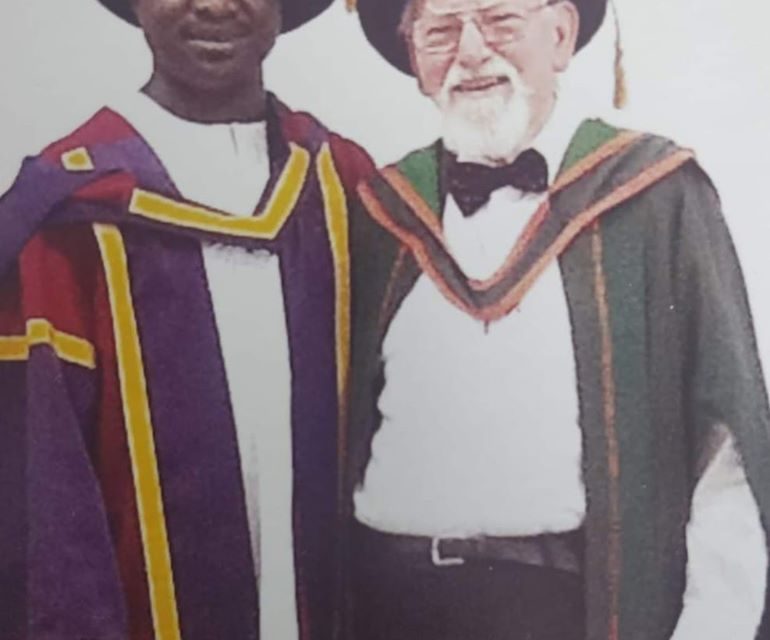Rev Professor David Dunn-Wilson’s immense positivity and spirituality was contagious. David was an outstanding gift to the Church, the academia and the ecumenical movement. He was a church leader, theologian, and ecumenist. He gave generously and passionately to the missional life-giving, liberative and transformative mission agenda of the community of faith. He gave of himself as far as he was able both at home and abroad. David’s thinking was always missional, authentic, stimulating and exciting. He fuelled a sense of energy and renewal that stirred our heads as his students at Cliff College.
Paul Gould in one of his books, The Outrageous idea of the Missional Professor described missional to be a specific posture or identity of the Christian professor. Gould’s description of a missional professor as ‘one who understands and lives her life in the light of God’s story and God’s mission (the missio dei),’[1] helps to remember David’s boldness and faithfulness that ‘involves taking up the mission of Jesus’ not only in the academy but in the secular, post-Truth culture. Indeed, God used David as a professor ‘to reach others, transform the academy, and meet the needs of the world.’ David as a missional professor had a very ‘clear vision of God’s heart for the lost as well as humankind’s purpose and calling under the banner of Christ, an understanding of the significance of the university as a cultural shaping institution and mission field, and a desire for Christian wholeness in a fragmented world.’ David was a role model who led the way by living missionally with a clear vision. David as missional professor located his life firmly within the context of God’s story as articulated in the Bible.
David was a Methodist minister as were his father and grandfather before him. He had his theological studies in Britain and the United States before ‘he was appointed by his church to lead Evangelistic Missions. He then went on to serve British churches for a further 25 years before hearing the call to serve overseas. David and his wife Elizabeth worked as mission-partners in the Panama/Costa Rica District, first in Panama City and then in the jungle with the Guaymi Indians. Returning to England he was appointed as Lecturer in Mission and Pastoral Studies at Hartley Victoria Theological College in Manchester. He was then asked to go to Kenya as Head of The Department of Theology at Kenya Methodist University where he served for four years.’
When he retired to the U.K., David served as an Adjunct Lecturer in Cliff College’s Postgraduate Department after his retirement to UK. He joined the Cliff College’s International Training Centre (CCITC) working in West and East Africa under the leadership of his friend, Rev Dr Richard Jackson. David made a profound contribution to Cliff College, British and Nigerian Methodism and partnership. In some ways, one can think about David as having had many successful callings: firstly as an internationally renowned mission practitioner and scholar, an evangelist and prophetic God’s mouth piece, with a particular flair for engaging with church leaders and students, who spent hundreds of hours in classrooms up and down United Kingdom and outside. His sudden departure has created a vacuum that shall be felt by all who knew him for a very long time. We his students celebrate the treasured gift he was to all of us at Cliff College and thank his family for allowing us to share him with them. David was a man and a father figure who led by example and has been a model of how to achieve things through his caring, nurturing and kindly nature, as well as through his sacrificial lifestyle.
On missiological approaches to theology, David taught us different approaches – theology as curiosity, theology as comfort, theology as conspiracy and theology as instinct. However, he warned that the motive of doing theology matters. According to David, Christian theology is different from other theologies, that is, the theology in reverse, a supremely tolerance approach even extended to people without faith, ‘not matter what you belief, so far you are not doing any harm.’ According to David, there is divine initiative in a missiological approach to theology. The divine invitation to theology based on a key passage in the Gospel of Mark goes with the promise of mission (Mk 1:17). This is what David called, ‘the fusion of theology and missiology.’ No student under the feet of David will forget the nature, the elements and the essence of missiological theology based on Jesus words saying “The time is fulfilled and the kingdom of God is at hand, Repent, and believe in the gospel” (Mk 1:15). Therefore as missiological navigator working as missionary practitioners, participating and working for the solution, David taught us that the nature of missiological theology is about joyful good news with opportunity for change, repentance, and conversion of soul into Christian faith.
To David, “principalities and powers” points to ‘mission as contest.’ In essence, the why of mission is about the problem of evil and sin. David provides seven major contest in order to understand the true nature of mission. The prophetic mission in relation to the practice of dualism or monotheism calls for the exaltation of the God of Israel, the Almighty God. The Inter-Testamental mission is about mission and suffering bearing in mind the experience of the great gulf that Jesus crossed in the incarnation in the face of angels and demons. Gospel mission based on Jesus’s true incarnation come with the healing mission and this provides the basis for Pauline mission as a struggle against principalities and powers. David explained this with re-writing of theology based on Apostle Paul’s reference to handwritten certificate of debt signed by every debtor. The list of God’s law that we had broken stands against humanity as proof of our sin. The debt of our sin is more than we could ever pay. God blotted out this debt, nailed the proof of it to the cross when Christ died for us.
The fifth contest is the Christendom mission, that is, mission and conquest shaped by patristic attitudes and human motives shaped by power and preeminence. This involved the usage of the ‘warrior of Christ’ who travelled to the frontiers searching for land and spreading the news of the teaching of Jesus Christ to every corner of Christendom. The military expansion of Christendom’s frontiers opened the door to Enlightenment mission and individualism. Evil became an illusion and individual, hence the need for converting individuals. In the words of Andrew Kirk, Enlightenment mission as a massive act of cultural adjustment is the basis ‘of modern Western theology, whether liberal or conservative.’ The last contest of mission is the ‘Third Wave’ mission that gave rise to Pentecostalism with the tactics of spiritual warfare.
David as a scholar and mission practitioner points us to the perspectives on personal and church mission practice. The need for missional perspective is to help us to identify the context, the mission, the missioners, the obstacles and a path – the way forward in other to rescue the lost generation and church decline. The context based on the decline of “Christian” Europe, the burden of history, rise of secularism, the disillusion of war, the rise of scientific scepticism, the incursion of other faith climaxed with the present state of the ‘dry sponge’ spirituality and leadership. To react to these context, David invites us to identify the mission by defining what is Christian ‘mission’ based on the primacy of conversion in order to overcome the scandal of the mission. David believed that, in identifying the missioners, we have the mandate to make followers. The ‘people in the pews’ are the missioners, hence as the evangelistic community, we have to identify the obstacles and hindrances to mission. David identified the bewilderment of the ‘people in the pews’ asking why Christianity? He called this attitude ‘portmanteau spirituality,’ not rejecting Christianity, but never know it. This is our contemporary spiritual scene coupled with pseudo Christians as biggest obstacle to Christianity. David reminds us that the message is, what does salvation means in today’s terms? How do we make salvation relevant? To rescue the lost generation, there is need to change the idea of just keeping things going congregation to evangelist community; from protective congregation to evangelistic congregation.
David will be remembered for his selfless missionary gifting and service especially in Africa. A former prelate, Methodist Church Nigeria, His Eminence Sunday Makinde described David as ‘very amiable and hard working. He gave us series of lecture when the Bishops in Nigeria went for Refresher Course at Cliff College.’
David as author of many books lectured ‘widely on Missiology, blending Mission with Church History and Biblical Studies. However, he has always retained his interest in his local churches.’ He later devoted his time to preaching, writing and teaching in the Central Sussex United Area serving Methodist, U.R.C. and other churches.
David was a Christian and a scholar with pure mind. He was a Bible teacher and mission practitioner to the core. David said, “Normally, I will use The Contemporary English Version of the Bible, but there will be times when my beloved King James’ Version will make its claims upon me … Nowadays, so many wonderful hymns are flowing from the contemporary ‘hymn explosion,’ that it is easy for me to forget the treasury of ‘classic’ hymns. I’m sorry that most of my choices come from ages which were not gender-sensitive but, nevertheless, I hope that they will help to personalise the message for readers of whatever gender, age and cultural background.” David revealed to us what it mean to remain faithful follower of Jesus and as a university professor. He proved that there is a place for distinctively Christian views within the secular academy and culture. David’s legacy counters ‘Richard Dawkins and his ilk, who continue to characterise religion and religious folks as delusional.’ David unlike existing ‘Christian professors, many with ‘an underdeveloped theology of faith and reason, leading to an anemic sense of scholarly calling, … yield an intellectually robust and spiritually mature sense of mission.’ David successfully integrated his Christian faith with his ‘scholarship for the purpose of pointing souls to Christ.
David as a missional professor aligned his vision, ministry and mission ‘with the mission of God, thus professing Christ in whatever way is possible and prudent.’ His call for opening prayer and closing prayer after his lectures goes beyond the prevailing idea of ‘value-neutral scholarship’ in the academy. David’s teachings were full of moral, religious, leadership values and ideologies. David was very courageous ‘in light of the subtle or not subtle pressure within the academia community toward conformity in terms of norms, practices, foundational assumptions, and lifestyle.’ David’s call was self-consciously “on mission” within the church and the university bearing in mind this ‘requires a boldness to be different – to engage in the scholarly (and institution) enterprise with one eye toward the gospel and the other toward a lost and needy world.’
Beyond the academia concept and the purpose of higher education of ‘the transmission of knowledge and the conferring of analytical skills,’ David by his teaching and lifestyle redefined ‘a mechanical picture of academia as a factory’ to a place of personal renewal in order to hasten corporate renewal. David as a missional professor built his teachings and ministry on the compelling story of reality, ‘the biblical metanarrative of creation, fall, and redemption … offering fulfilment to anyone who believes.’[2] The ministry of David as a missional professor within the church leadership and academia is refreshing and contagious, drawing people to himself and through himself to Jesus Christ. In the words of Gould, the ‘subtext’ of David’s lifestyle and ministry is not, “Look how great I am,” or “Look how impressive my CV is.” Instead it is, “Look how great Christ is.” My experience and other students under David ‘causes eyebrows to lift, heads to turn, hearts to awaken, consciences to become convicted, and lives to be challenged.’ David’s generous actions, words and smiles he gave in your direction was a representation of his deep Christianity and power to view the world and those before him through missional lens.
David who had made preparations for his funeral service lived a full and fruitful life, and his fruits abides. He gave much and took us far especially through his annual Lenten books. His legacy and labour of love will live on in the contribution of those of us who learnt from him and are committed to continuing the need for missional leadership and church renewal. To continue David’s saintly and missional legacies is to respond to his invitation in one of his Lenten books. David said in December 2017, “I want to invite you to join me in looking again at the greatest performance ever seen. It is nothing less than God’s Drama of Salvation. The Bible is its script and it has a cast of thousands …Please accept my invitation. If you are ready, please settle back in your seat and let the performance begin…”
Rest in peace, dear Professor. Your work lives on in me and those you inspired and influenced.
[1] Gould, Paul, The Outrageous idea of the Missional Professor (Eugene, OR: Wipf and Stock, 2014), pp. 1-3
[2] Sarah Geis, https://www.academia.edu/21710231/Review_The_Outrageous_Idea_of_the_Missional_Professor











Recent Comments